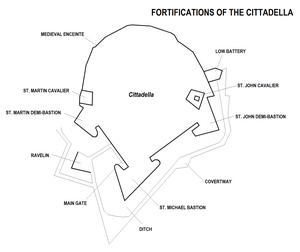Cittadella (Gozo)
| Cittadella | |
|---|---|
| Iċ-Ċittadella | |
| Victoria, Gozo, Malta | |

View of the Cittadella from the east
|
|

Map of the Cittadella
|
|
| Coordinates | 36°2′47″N 14°14′22″E / 36.04639°N 14.23944°ECoordinates: 36°2′47″N 14°14′22″E / 36.04639°N 14.23944°E |
| Type | Citadel |
| Site information | |
| Owner |
Government of Malta Various private owners |
| Open to the public |
Yes |
| Condition | Intact |
| Site history | |
| Built |
c. 1500 BC (first fortifications) 15th century – 1622 (present fortifications) |
| Built by |
Crown of Aragon Order of Saint John |
| In use | c. 1500 BC – 1868 |
| Materials | Limestone |
| Battles/wars |
Invasion of Gozo (1551) Capture of Gozo (1798) |
| Garrison information | |
| Past commanders |
Gelatian de Sessa (attack of 1551) |
The Cittadella (Maltese: Iċ-Ċittadella), also known as the Citadel, the Castello (Maltese: Il-Kastell) or the Gran Castello, is a citadel in Victoria, on the island of Gozo in Malta. The area has been inhabited since the Bronze Age. The present configuration of the Cittadella is a combination of a medieval castle and an early modern gunpowder fortress, with its northern walls retaining a largely medieval form and its southern walls dating back to a 17th-century reconstruction. The Cittadella has been included on Malta's tentative list of UNESCO World Heritage Sites since 1998.
Although there is only limited evidence of Neolithic remains in the Cittadella or Victoria, it is likely that the area has been inhabited since the Stone Age, given its size and strategic position. Archaeological remains show that the site of the Cittadella was definitely inhabited during the Bronze Age, in the Tarxien Cemetery and Borġ in-Nadur phases of Maltese prehistory.
The Victoria area remained the main settlement on Gozo throughout the Phoenician and Roman periods, and it became a settlement known as Gaulos or Glauconis Civitas. The city consisted of an acropolis on the site of the Cittadella, and a fortified town in an area now occupied by part of Victoria. A temple dedicated to Juno is said to have stood on the site now occupied by the cathedral. A number of architectural fragments from Gaulos have survived, including a 2nd-century AD Latin inscription on a limestone block that was reused in the main gate of the Cittadella.
...
Wikipedia

